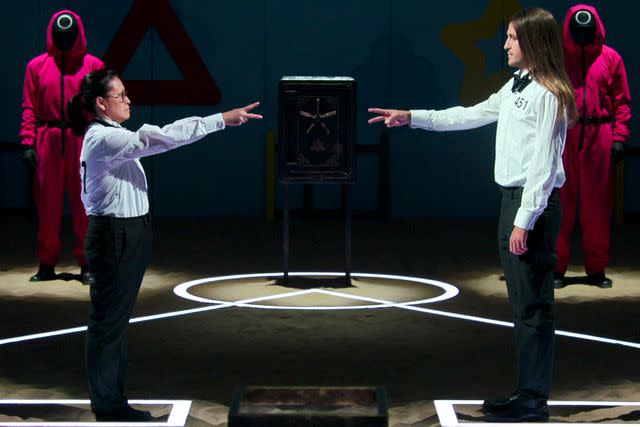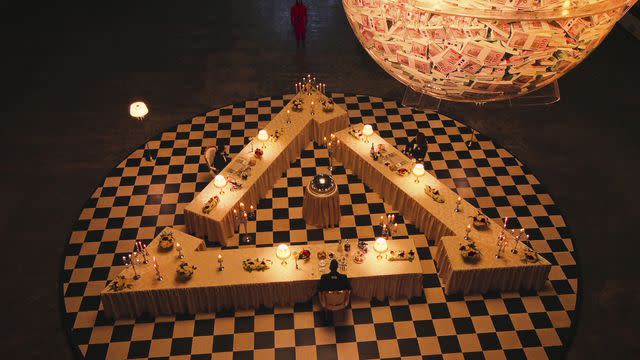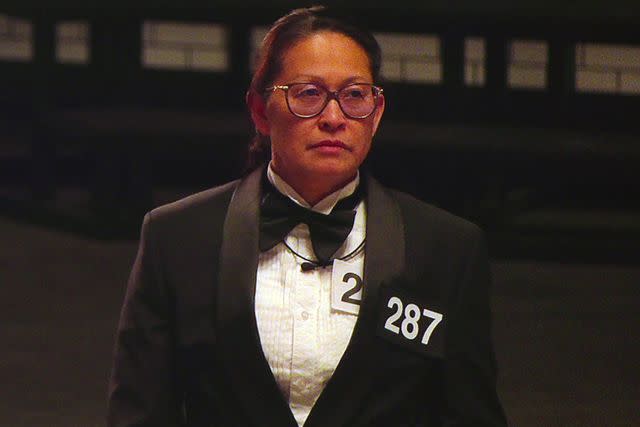“Squid Game: The Challenge” producers reveal other options were considered for final game
- Oops!Something went wrong.Please try again later.
- Oops!Something went wrong.Please try again later.
An intense round of Rock, Paper, Scissors wasn't the only idea they had for the finale.
Warning: This article contains spoilers for the season finale of Squid Game: The Challenge.
Squid Game: The Challenge might be the most unpredictable reality competition yet due to how much luck and chance determined the outcome of most games. But perhaps the most shocking development in the first season of Netflix's Squid Game reality spinoff? The fact that it all came down to an intense Rock, Paper, Scissors showdown.
But the finale could have looked very different. Squid Game: The Challenge producers John Hay and Stephen Lambert tell EW that other ideas were considered for the last game. Plus, they break down how Player 287/Mai Whelan beat Player 451/Phill Cain to take home the massive $4.56 million prize and so much more. Check out their full interview below.

Courtesy of Netflix
ENTERTAINMENT WEEKLY: The steak dinner is taken right from Squid Game, but where did the idea come from to add in the button-pushing game of chance?
JOHN HAY: Well, we thought we'd avoid anyone stabbing anyone else with a steak knife, to start. But it's the same challenge we faced all the way through the series, really, which is to create something that felt true to the world and dynamics and atmosphere of what happened in the scripted show, but also worked in an unscripted context. We threw a few ideas around before we came up with the buttons. The buttons felt like they had some of the essence of what was happening in that reduction of three to two — without involving any actual violence.
STEPHEN LAMBERT: We spent a long time working on the probabilities and trying to assess whether or not people would [step up] ... because our worry was that nobody would go up, they would just sit there and wait. But whether our math was right or not, the belief was that it was better to go up first, because then you had a two-thirds of a chance that you would either pick the button that did nothing or you'd pick the button that would take you through. Whereas if you waited, that's where the math starts getting complicated. Somebody else goes up and then you're now 50/50 because if the previous person has picked ... [laughs] anyway, I'll stop.
HAY: You're taking me back, Stephen, to the day of our brains coming out of our ears with trying to calculate the probability math, and then calling various academics and people who were really experts in the field. Mai, correctly in my opinion, thought that if she didn't go up and one of the other two did and they picked the green button, then she would be toast. Because they would pick the other guy if they had picked the green. She went and of course she got the neutral button, so then, again, Sam and Phill could have just carried on sitting there, but they decided that one of them had to play ball, and they did. Unfortunately, it wasn't good for Sam.
LAMBERT: But it shows the interaction of game and character, because we had to design and settle on that game before we knew who was in the final. There is a very logical mathematical layer of probability behind it, but also it changes totally depending on what the relationships are between those three people. There's a knowable and an unknowable part of it, and it became very interesting when it was Phil, Sam, and Mai because you knew the dynamics of that trio would change the outcome too.
You mentioned that you had other ideas for that game. What were those other options?
HAY: [Laughs] We're saving them for other shows. And now we've got a season 2, we should definitely not disclose them.
Why did you make the final game Rock, Paper, Scissors, and not Squid Game like we saw on the show?
LAMBERT: Because Squid Game becomes a very violent game. And once you're competing for a lot of money ... I mean, even the children at the beginning of Squid Game the drama, the kids you see, they get quite rough with each other. So what happens when you have adults playing it for $4.56 million? It inevitably would descend into something that would be inappropriate. We had to come up with something that was a classic, and what we liked about it was that the way we devised it, it meant that when you play Rock, Paper, Scissors as just one round, it's pretty much a game of chance, but if you play it over a period and play several games, then there are skills that start kicking in.
Some people are better at predicting what the other person is going to do, and that's what we got. Mai definitely did better than Phill, and that meant that she had more chances of picking a key and winning the money. We liked the fact that it was a classic game of luck, but the way we did it meant that there was also some skill. It felt like it picked up a theme from the Circle of Trust game in that it is also about reading other people and holding your nerve under pressure, and that felt appropriate.

Netflix
Were other games considered for the final challenge as well?
HAY: We cannot answer that. I mean, we definitely considered other games, but we can't share what they were.
LAMBERT: [Doing Rock, Paper, Scissors] is subverting expectations, but it's also absolutely in line with the Squid Game world where there's the simplest of games with the highest of stakes. It just felt like it was a very pure version of that.
Tell me more about adding in the aspect of the keys to extend the game.
LAMBERT: It was a way of giving a reward for each round, but at the same time, it didn't mean that you ended the game. That reward was only a partial reward, and in fact, the odds were against you when you won the chance to pick a key up. We liked the fact that it would extend the game and allow for what we were talking about earlier, which was if you had better, greater skills at playing the game, at reading each other, then the advantage would start coming your way.
How many rounds did Mai and Phill play Rock, Paper, Scissors?
LAMBERT: Quite a lot. About 30 games.
HAY: And Mai won most of them.
What did you think of how Mai won the whole thing? Did you predict that in the moment?
LAMBERT: We were all very happy with either Phill or Mai winning that final game. It became quite clear that Mai was playing it better and therefore the odds were in her favor, so one thought she's likely to win it, but such was the design of the game that you could be doing badly in the run of Rock, Paper, Scissors but get lucky and pick the right key. We were very happy with whoever would've won it, but Mai played a very good game.
HAY: It was a proper moment, watching Mai's win in the [production] gallery. It felt incredibly intense watching each approach to the safe with the key. Personally, it felt very emotional when Mai won. You realize the enormity of what it meant and what it was going to do, as the prize is obviously an extraordinarily unprecedentedly high one. You suddenly, in that moment, felt the impact of what that was going to do to change her life.

Courtesy of Netflix
Did the credit card in the safe really have $4.56 million on it, or was that just a prop card?
LAMBERT: The card is connected to a bank account. You can't have a credit card that's not tied to a person, so in that sense it was a prop, yeah. But it did genuinely bestow $4.56 million on Mai, so it had that power.
So there wasn't a gift card laying around on set with $4.56 million on it.
LAMBERT: [Laughs] You had to have been witnessed winning the game first before the money would flow to it.
HAY: That would've taken even more guards than we had.
Otherwise, Phill could have just reached his hand in the safe, grabbed it, and sprinted away a multi-millionaire.
Hay: Half the producers would have [done] that.
Where did the idea come from to show a montage of prominent players from the season back in their real lives to end the finale?
LAMBERT: We all talked about how we end it, and initially we had a cut where it just ended with Mai. But that was a very intense environment for the end of the show, and the idea of stepping out, seeing a bit of sky, and then discovering where everybody was, it came up as a possibility and we all got quite excited by it. We had deliberately not included footage of our cast at home when we were planning the show. We thought we may drop into moments of sort of backstory where we meet people in their homes, but the quality of interviews that we got from the processing rooms were so good that it seemed to do the work of what we would get from going to their homes and doing that where it's much less intense.
But a chance to see them in their homes just briefly at the end, or in their own environments, seemed like a lovely way of reminding viewers of all those players that had been particularly prominent. It was a warm change of mood, which then changed the game as we teed up the fact that season 2 was coming.
HAY: One of the most lovely things about watching the reaction to the show has been the sense of connection to some of these characters. And it felt like leaving a party without saying goodbye to your friends, to not check in with them towards the end. The other thing is that Squid Game is tough — it's a very stern test of people's abilities and character, but in the end, humanity wins. And we wanted that dose of warmth at the end. It's a reminder of something positive to leave on.
Plus it serves as a reminder that these people didn't actually die.
HAY: [Laughs] We were pretty much hoping that nobody was under any illusions about that as they were watching. But yes, if anyone was still having any doubts about it, it solved that too.
This interview has been edited for length and clarity.
Squid Game: The Challenge season 1 is now streaming on Netflix, and will return for season 2.
Sign up for Entertainment Weekly's free daily newsletter to get breaking TV news, exclusive first looks, recaps, reviews, interviews with your favorite stars, and more.
Related content:
Squid Game: The Challenge Player 287/Mai on her 'dominating' performance, beef with Ashley, and more
Squid Game: The Challenge Player 451/Phill on 'silliest' Rock, Paper, Scissors, Mai's lie, and more
Squid Game: The Challenge Player 016/Sam on why he 'needed to step up' in finale
Here's who won Squid Game: The Challenge — by playing Rock, Paper, Scissors
Green light! Netflix renews Squid Game: The Challenge for season 2
Squid Game: The Challenge player reveals lubricated condoms were used as chapstick
Squid Game: The Challenge players reveal what they ate, took from the set and more
Squid Game: The Challenge producers answer episodes 6-9 burning questions
Squid Game: The Challenge players did not fall through the glass during Glass Bridge
Survivor alum Figgy talks going on Squid Game: The Challenge as 'more confident this time'
Umbrella cookie guy speaks! Squid Game: The Challenge Player 299/Spencer unpacks that intense moment
Squid Game: The Challenge producers answer burning questions about the games, eliminations and more
Squid Game reality show producers say reports of 'inhumane' conditions were 'not accurate'
Attention all players: The Squid Game reality show is actually good
Read the original article on Entertainment Weekly.

